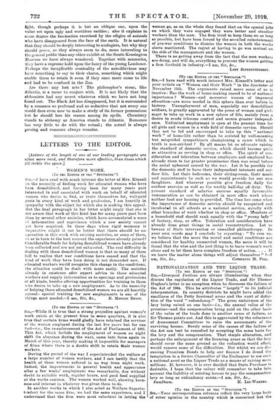[To THE EDITOR OF THE " SPECTATOR.") Sin, —I have read
with much interest Mrs. Kinnell's letter and your article on " Women and their Work " in the Spectator of November 15th. The arguments raised move some of us to inquire : Has the work of home-making ceased to be of national importance ? Women—and moreover women of improved education—are more needed in this sphere than ever before in history. Unemployment of men, especially our demobilized soldiers, is greatly aggravated by the press of women and girls eager to take up work in a new sphere of life, mainly from a desire to evade irksome control and secure greater independ- ence. Unlimited employment is open at the present time for all girls and women in a wide field of domestic service. Should they not be led and encouraged to take up this " national work " of home-life rather than be assisted by well-meaning but misguided sympathizers championing a cause which in truth is non-existent ? By all means let us advocate raising the standard of domestic service, which should become quite as attractive as serving in shop or office. The spirit of con- sideration and toleration between employers and employed has already risen to far greater prominence than was usual before the social upheaval caused by the war. Let it be possible for the domestic staff to have their independent interests and out- door life. Let their bedrooms, their sitting-room, their meals and appointments be such as we would provide for our own daughters. And wherever possible give freedom daily for outdoor exercise as well as the weekly half-day off duty. The present standard of salaries ensures equally favourable remuneration as can be obtained in most office work where neither food nor housing is provided. The time has come when the importance of domestic service should be recognized and inculcated in all schools as a national service, equally with other branches of work whether in shop or office. Members of a household staff should rank equally with the " young lady " of factory, shop, or office. Toleration and consideration have already done great things in social reconstruction. Let us beware of State intervention or one-sided philanthropy. In your own words may I conclude by repeating : " To sum up, we believe that the more the moral and social conditions are considered for healthy unmarried women, the more it will be found that the wise and the just thing is to leave women's work alone and to let them have complete freedom of action. . . . If we leave the matter alone things will adjust themselves "










































 Previous page
Previous page